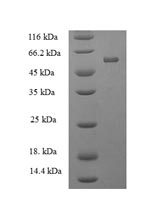Recombinant Human protein-tyrosine-phosphatase (PTPRR) is expressed in E. coli and spans the complete sequence of 1-412 amino acids. The protein includes an N-terminal 6xHis-SUMO tag, which allows for straightforward purification and detection. Purity levels exceed 90%, as confirmed by SDS-PAGE, suggesting consistent quality for research applications. This protein is intended for research use only.
Protein-tyrosine-phosphatase (PTPRR) appears to play a central role in cellular signaling by regulating phosphorylation states. The enzyme is involved in modulating various signaling pathways through dephosphorylation of tyrosine residues on target proteins. PTPRR likely influences processes such as cell growth and differentiation by controlling the activity of specific kinases and phosphatases. This makes it an attractive target for research in cellular and molecular biology.
Potential Applications
Note: The applications listed below are based on what we know about this protein's biological functions, published research, and experience from experts in the field. However, we haven't fully tested all of these applications ourselves yet. We'd recommend running some preliminary tests first to make sure they work for your specific research goals.
Human PTPRR is a protein tyrosine phosphatase that requires precise folding, proper active site formation (with a catalytic cysteine residue), and specific tertiary structure for its enzymatic activity. The E. coli expression system cannot provide the optimal eukaryotic folding environment and may lack specific post-translational modifications. The N-terminal 6xHis-SUMO tag (∼15 kDa) may sterically interfere with the protein's functional domains or active site. While the full-length protein (1-412aa) contains all functional domains, the probability of correct folding with functional phosphatase activity requires experimental validation.
1. Protein-Protein Interaction Studies Using Pull-Down Assays
This application requires proper folding validation. PTPRR interactions with substrates or regulatory proteins require precise tertiary structure. If correctly folded (verified), the protein may identify physiological interaction partners. If misfolded/unverified, there is a high risk of non-specific binding or failure to replicate genuine protein interactions. The SUMO tag may create artificial interaction surfaces.
2. Antibody Development and Validation
This application is highly suitable as antibody development relies on antigenic sequence recognition rather than functional enzymatic activity. The full-length protein provides comprehensive epitope coverage for generating antibodies against PTPRR. The high purity (>90%) ensures minimal contamination-related issues during immunization protocols.
3. Structural and Biophysical Characterization Studies
These studies are essential for determining folding status. Techniques should include circular dichroism spectroscopy to assess secondary structure, size-exclusion chromatography to evaluate oligomeric state, and thermal shift assays to determine stability. However, the SUMO tag may interfere with high-resolution structural studies
4. In Vitro Enzyme Kinetics and Inhibitor Screening
This application carries a significant risk without functional validation. Phosphatase activity requires precise active site formation and catalytic cysteine functionality. If correctly folded and active (verified), the protein may be suitable for kinetic studies. If misfolded/inactive (unverified), enzymatic assays will yield biologically meaningless results. The SUMO tag may sterically interfere with substrate access.
Final Recommendation & Action Plan
The E. coli expression system with a large SUMO tag poses challenges for producing a functionally active PTPRR phosphatase. Begin with Application 3 (Structural Characterization) to assess folding quality through CD spectroscopy, SEC, and to validate phosphatase activity using standard substrates. Applications 1 and 4 require rigorous functional validation before proceeding. Application 2 (antibody development) can proceed immediately. Consider tag removal for critical functional studies. Always include appropriate activity controls and validate key findings with eukaryotic-expressed PTPRR when possible.






